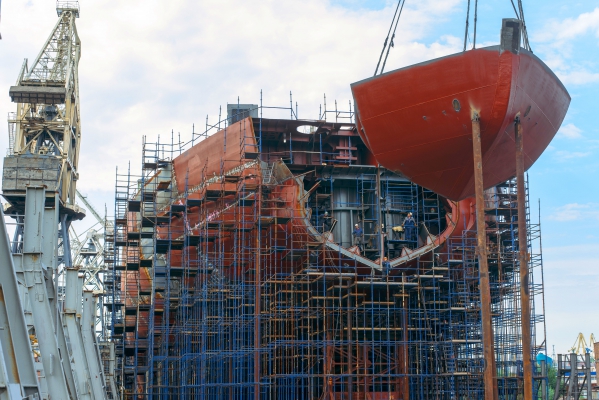
From Ukraine peace plans to Kazakh uranium—all that and more in our new nuclear digest
Our November Nuclear Digest by Bellona’s Environmental Transparency Center is out now. Here’s a quick taste of just three nuclear issues arising in U...
News

Publish date: March 6, 2017
News
It was expected from earlier reports of meetings between Russia’s nuclear icebreaker port Atomflot and shipbuilders that a new line of ships to troll through Arctic ice would be delayed. But new reports emerging last week show that unpaid bills and sanctions from the west are holding not only icebreaker development hostage, but Kremlin aspirations to drill oil in the Arctic as well.
Russia’s DP.RU reported that the Baltisky Zavod shipyard in St Petersburg – which is building the Arktika, the enormous lead ship in the new LK-60 icebreaker line – wouldn’t meet its deadline because the yard hadn’t paid builders. Holding up the icebreakers, the portal and other sources said, would jeopardize the Kremlin’s aspirations to drill natural gas on the Yamal peninsula.
The newline ships are supposed to escort oil freighters back and forth though ice up to three meters thick as well as ply the rivers of Northern Siberia to help deliver oil and gas from inland sources.
Atomflot last month confirmed that the Arktika would roll out a year behind schedule for a launch date of 2019, constituting one of several deadlines that have already been breached. The two other icebreakers in the new line, the Ural and the Sibir, are also running behind schedule.
 A mock up of the Arktika leading ships through icy waters. (Picture: Atomflot)
A mock up of the Arktika leading ships through icy waters. (Picture: Atomflot)
Central to the snag is who will produce the steam turbines necessary for the ships propulsion system, and since the United States and the European Union imposed sanctions on Russia in 2014, finding a manufacturer is getting harder.
According to DP.RU, The Baltisky Zavod shipyard is miffed with the Kirovsky Savod, and is suing it for holding up the works. Baltisky Zavod wants to hand the turbine contract to the Kaluga Turbine Works. But that’s not going anywhere as yet because Baltisky Zavod is also suing the Kaluga Design Institute for delivering the blueprints for the turbines late.
None of this would have happened, the portal suggests, if Russia hadn’t annexed Crimea and brought sanctions upon itself.
The original producer for the turbines was supposed to be TurboAtom, based in Ukraine. But after a rigged referendum put the Crimean Peninsula in Moscow’s hands over the loud objections of the international community, Ukraine stopped doing business with Moscow.
The sanctions also froze out the British subsidiary of General Electric, which was once upon a time in the running to make the turbine, but now, because Britain refuses to do business with Russia as well, it won’t.
The icebreaker delays represent yet another time sanctions have derailed the Kremlin’s wish to rapidly carve up the Arctic to drill for what’s estimated to be 22 percent of the world’s untapped oil and gas reserves. The most spectacular example was the US sanctions that torpedoed a $500 billion deal between ExxonMobil and Russian state gas giant Rosneft in 2014.
US President Donald Trump’s appointment of ExxonMobil CEO Rex Tillerson as Secretary of State seemed temporarily to offer Rosneft hope that the sanctions would be lifted and the oil deal would proceed.
But both Tillerson and Moscow – which is widely suspected of giving Trump a leg up to his surprise victory in November – are bystanders while Trump presidency lurches through a mire of speculation over just how involved in the US election Russia was.
Meanwhile, Andrei Zolotkov, a nuclear expert with Bellona who has served on Russian nuclear icebreakers, wasn’t surprised that the enormous new ships have run afoul of deadlines, and said that to him, the DP.RU report seemed accurate.
He pointed out that it would be more news worthy if a Russian nuclear project finished on time. Of course, he said, sanctions by the EU and the US helped push the project beyond its deadline, but he said that if it hadn’t been that, another excuse would have been found.
Making things more difficult for the icebreakers are the untested nature of their RITM-200 reactors. Unlike the reactors that will go on Russia’s floating nuclear power plant, which Zolotkov said were analogous to the reactors long produced for submarines, the RITM-200 still leaves a few questions to be answered, which will likely lead to yet further delays.

Our November Nuclear Digest by Bellona’s Environmental Transparency Center is out now. Here’s a quick taste of just three nuclear issues arising in U...

For three years now, Bellona has continued its work in exile from Vilnius, sustaining and expanding its analysis despite war, repression, and the collapse of international cooperation with Russia in the environmental and nuclear fields

The Board of the Bellona Foundation has appointed former Minister of Climate and the Environment Sveinung Rotevatn as Managing Director of Bellona No...

Økokrim, Norway’s authority for investigating and prosecuting economic and environmental crime, has imposed a record fine on Equinor following a comp...